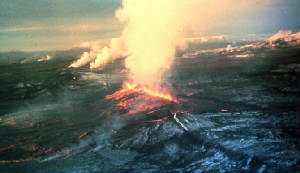 On 8 June 1783 the Laki Volcano in Iceland erupted. During 9 months the volcano produced an estimated 120 million tons of sulfur dioxide.
On 8 June 1783 the Laki Volcano in Iceland erupted. During 9 months the volcano produced an estimated 120 million tons of sulfur dioxide.
This amount was ten-times more than the amount that now comes from all of western European industrial sources in a year.
The Explosion of the Laki Vulcano triggered the Explosion of the French Revolution.
The cloud of sulfur dioxide in combination with a very strong El-Niño Cycle brought Extreme Weather Conditions for several years all over Europe. A huge amount of cattle and crops were destroyed causing extreme faminine and poverty.
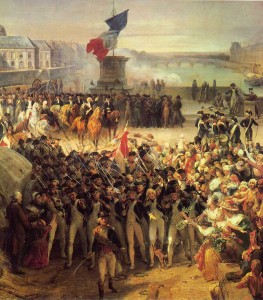 The great French revolution of 1789-1799 involved the most massive popular struggles that had yet been seen in history.
The great French revolution of 1789-1799 involved the most massive popular struggles that had yet been seen in history.
Rooted in popular hatred of an oppressive monarchy, the revolution rose on the backs of the masses of poor people in Paris who united under the banner of ‘liberty, equality and community’.
“Liberty is no more than an empty shell when one class of men is allowed to condemn another to starvation without any measures being taken against them. And Equality is also an empty shell when the rich, by exercising their economic monopolies, have the power of life or death over other members of the Community” (The Red Priest, Jaques Roux).
The term “socialism” appeared in print in England in 1827. Five years later, the term was used for the first time in a French publication.
Socialism is a product of the Industrial revolution in England and the French Revolution.
One of the creations of the Socialistic Movement is the Cooperative. A Cooperative is a business organization owned and operated by a group of individuals for their mutual benefit. A Cooperative is the embodiment of the primary goals of the Revolution Liberty, Equality and Community.
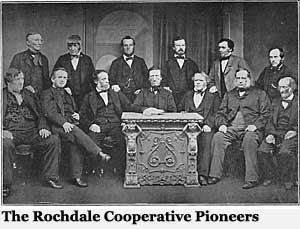 In 1844 a group of 28 artisans working in the cotton mills in the town of Rochdale, in the north of England established the first modern co-operative business, the Rochdale Equitable Pioneers Society.
In 1844 a group of 28 artisans working in the cotton mills in the town of Rochdale, in the north of England established the first modern co-operative business, the Rochdale Equitable Pioneers Society.
The weavers faced miserable working conditions and low wages, and they could not afford the high prices of food and household goods. They decided that by pooling their scarce resources and working together they could access basic goods at a lower price. Initially, there were only four items for sale: flour, oatmeal, sugar and butter.
The Pioneers decided it was time shoppers were treated with honesty, openness and respect, that they should be able to share in the profits that their custom contributed to and that they should have a democratic right to have a say in the business.
Every customer of the shop became a member and so had a true stake in the business. At first the co-op was open for only two nights a week, but within three months, business had grown so much that it was open five days a week. Within ten years there were over 1,000 co-operative societies in the United Kingdom.
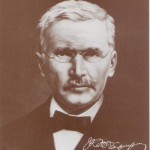 Wilhelm Raiffeisen founded the first cooperative lending bank, a credit union, in 1864.
Wilhelm Raiffeisen founded the first cooperative lending bank, a credit union, in 1864.
In 1867 Hermann Schulze-Delitzsch, a German liberal politician, obtained passage of a Prussian Law protecting Cooperative Associations. The Credit Unions evolved into a system of Cooperative Banking and Cooperative Insurance.
What Happened?
The explosion of the Laki Vulcano triggered the French Revolution. The slogan of this revolution, liberty, equality and community, has inspired many other revolutions all over the world until today.
The French Revolution was a revolution of the Underclass. It failed in the sense that the Calvinistic Bourgeoisie, the Middle Class, the owners of the Small and Medium sized Companies, took over the power from the Aristocracy.
The Bourgeoisie took advantage of the poor, mostly unemployed, Underclass to create a new system of Dominance, the Capitalistic system. In this system the poor slaves were forced to do productive work in the factories. The capitalistic elite invented new (The Consumer, Mass Media) systems to prohibit a new revolution.
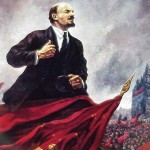 In the other countries (China, Russia, Cuba …) the revolutions of the underclass also failed. The old pattern of mass manipulation by a small elite always returns.
In the other countries (China, Russia, Cuba …) the revolutions of the underclass also failed. The old pattern of mass manipulation by a small elite always returns.
At this moment we see a new System of Dominance emerging. It is the fusion of Capitalism and Fascism, The Big Brother State.
The Big Brother State is using Mass Manipulation strategies in combination with Computer Technology (Pattern Recognition) and Mind Control.
The only successful Social and Socialistic System that emerged out of the French Revolution is the Cooperation.
This system has improved itself by introducing new structures based on Second Order Cybernetics (The Spiraling Organization) and new ways to create shared collaborative decisions (The Consent Principle, Sociocracy).
When Cooperations are too big the burocrats take over control. The Active members of the cooperative change into Voters. The old pattern of mass manipulation by a small elite always returns. Succesfull cooperations have to be based on a Human and a Local Scale.
What to Do?
The big burocratic corporations are unable to sustain in a huge crisis. The cooperative banks were never able to start highly risky financial gambling games. The principles of Rochdale prevent this.
At this moment the cooperative (now called a community) is on its return. Internet technology is created to support the cooperative. Cooperatives on a human scale (!) can be connected into big powerfull global networks.
I believe the French Revolution has finally reached its goal.
Arise, wretched of the earth
Arise, convicts of hunger
Reason thunders in its volcano
This is the eruption of the end
Of the past let us wipe the slate clean
Masses, slaves, arise, arise
The world is about to change its foundation
We are nothing, let us be all
This is the final struggle
Let us group together, and tomorrow
The Internationale
Will be the human race
LINKS
The history of Socialism by Friedrich Engels
About Sociocracy and the Consent Principle
About the Invisible Fascist State
About Neo-Capitalism and Fascism
Share This Post
Tags: China, Cooperative, Cuba, cybernetics, El Niño, England, Europe, extreme weather conditions, french revolution of 1789, Hermann Schulze-, Iceland, Paris, Revolution, Rochdale, Russia, sociocracy, system, United Kingdom, western European, Wilhelm Raiffeisen
